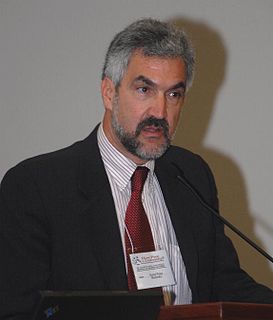A Quote by Bernard Lewis
I think confronted with the modern world or with the rest of the world, I think people are becoming aware that the Western and Islamic civilizations have more in common than apart. It was a German scholar, C. H. Becker, who said a long time ago that the real dividing line is not between Islam and Christendom; it's the dividing line East of Islam, between the Islamic and Christian worlds together on the one hand and the rest of the world on the other. I think there is a lot of truth in that.
Related Quotes
I think there is a lot of continuity between the Jewish and the Islamic traditions. We know this historically, though people don't want to talk about that - especially Muslims. There is a common source for both Judaism and Islam, or let's say that Islam finds its source in Judaism. The commonalities of practice and sensibility, ethos and mythos, create a lot of overlap.
In the West nowadays, it's very common to talk about the Judeo- Christian tradition. It's a common term. The term is relatively modern but the reality is an old one. One could with equal justification talk about a Judeo-Islamic tradition or a Christian-Islamic tradition. These three religions are interlinked in many signification ways, which marks them off from the rest of the world. And I think there is a growing awareness of this among Christians and among Jews, and even to some extent to some Muslims. That's happening for obvious reasons.
The significance of the vast Islamic scientific tradition for Muslims and especially for young Muslims today is not only that it gives them a sense of pride in their own civilization because of the prestige that science fhas in the present day world. It is furthermore a testament to the way Islam was able to cultivate various sciences extensively without becoming alienated from the Islamic world view and without creating a science whose application would destroy the world of nature and the harmony that must exist between man and the natural environment.
In Islam there is a line between let's say freedom and the line which is then transgressed into immorality and irresponsibility and I think as far as this writer is concerned, unfortunately, he has been irresponsible with his freedom of speech. Salman Rushdie or indeed any writer who abuses the prophet, or indeed any prophet, under Islamic law, the sentence for that is actually death. It's got to be seen as a deterrent, so that other people should not commit the same mistake again.
Infuriatingly stupid analysts - especially people who called themselves Arabists, yet who seemed to know next to nothing about the reality of the Islamic world - wrote reams of commentary [after 9/11]. Their articles were all about Islam saving Aristotle and the zero, which medieval Muslim scholars had done more than eight hundred years ago; about Islam being a religion of peace and tolerance, not the slightest bit violent. These were fairy tales, nothing to do with the real world I knew.
I said I didn't respect religion... and anyone who believes in fairy tales to answer questions that we can't answer... So I don't respect our religions either. But I do believe it is a clash of civilizations, absolutely, between the Islamic world and the Western world. It has been going on for 1,000 years.
Sufis have always been those that have tried to purify the ethics of Islam and society. And they don't have their hands cut off from the external action at all. For example, the bazaar in which the Sufis were very strong always dominated economic life in Islamic world. They could give a much more sane and Islamic form of activity when the economic life of Islam moved out of the bazaar to new parts of Islamic cities with modernized Muslims, who took it in another light and it became very, very anti Islamic, and much against many of the most profound practices of Islamic societies.
We now have some years of very reliable polling by Western firms in the Islamic world, in multiple Islamic countries. And invariably, the question that asks, "Do you view U.S. foreign policy as an attack on Islam and Muslims?" is maxed out. Whether it's Jordan or Indonesia or Egypt, you get 80,85 percent of people saying "Yes."
We're going to have to rely on the world of Islam, major Islamic nations, to take the lead in helping promote a very different view of Islam - peace and understanding, as opposed to the radicalization going on. The Saudis and UAE and Qatar and others are going to have to take a leading role in changing hearts and minds in the world of Islam.






































